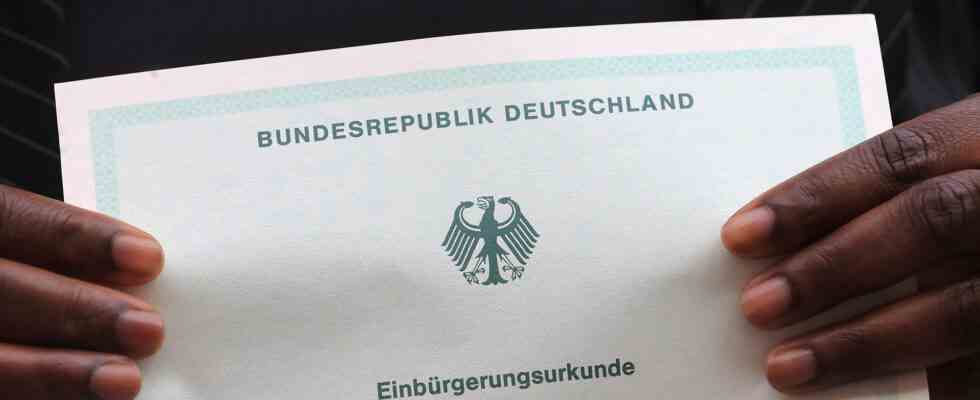Status: 11/26/2022 10:43 a.m
Germany needs “better regulations for all these great women and men” – this is how Chancellor Scholz campaigns for the naturalization reform. Praise also comes from experts. The Union, on the other hand, speaks of “sale of citizenship”.
Reactions to the traffic light coalition’s plans to reform German citizenship law have been mixed. Criticism comes mainly from the ranks of the Union, praise comes from business and science, as well as from associations that represent people with a migration background.
Chancellor Olaf Scholz campaigned for “better regulations” for naturalization. In his video message “Kanzler compact” he recalled above all the importance of immigration for prosperity: “Germany has become a country that is the land of hope for many. And the women and men and sometimes children who come to Germany have contributed greatly to our economy being as strong as it is today.”
It is very good “if those who have lived with us for so long also decide to acquire German citizenship,” said the Chancellor. Germany needs “better regulations for the naturalization of all these great women and men”.
DIW: Important element for attractiveness
The President of the German Institute for Economic Research (DIW), Marcel Fratzscher, also supports the plans: “Germany’s skilled labor problem will become much worse due to demographics and increasing competition for the brightest minds if politicians don’t act much more decisively than before,” Fratzscher told the “Handelsblatt”. A clear perspective on nationality is an important element in making Germany more attractive to foreign skilled workers.
“No longer the reality of our days”
The chairman of the Turkish community, Gökay Sofuoglu, spoke of a “paradigm shift”. German citizenship law “no longer reflects the reality of our time; it has to be tackled from the ground up,” Sofuoglu told the newspapers of the “Redaktionsnetzwerk Deutschland”. It is also about achieving a certain level of equality and thus enabling more people to participate in politics.
Migration expert Petra Bendel made a similar statement. The reform could lead to more people being naturalized and no longer being excluded from political participation, said the chairwoman of the Advisory Council on Integration and Migration tagesschau.de-Interview.
According to Bendel, democracy legitimizes itself primarily through elections. And very many people who live here have so far been excluded from this form of participation, which is only guaranteed by citizenship.
Holding multiple citizenships easier
According to Bendel, around nine million people live in Germany who do not have German citizenship. Many of them could already be naturalized if they wanted to, but others do not yet meet the naturalization requirements. The draft law by Federal Interior Minister Nancy Faeser, which according to the ministry is “almost ready”, now wants to lower the hurdles in some points.
Anyone who has been living in Germany with a residence permit for many years should be able to be naturalized after five years instead of the previous eight years. For seniors who are older than 67 years old, Faeser wants to delete the formal language certificates previously required. Instead, the “ability to communicate verbally” should be sufficient in the future. And holding multiple citizenships is set to become much easier with the reform.
The reform also provides for changes for children born in Germany to foreign parents. They should automatically become Germans if one parent has had their “lawful habitual residence” in Germany for five years. So far, this has only been the case after eight years.
“I speak Swabian better than Turkish”
The example of Green Party politician Cem Özdemir also illustrates what it’s like to grow up as a child in Germany without being German on paper. The Federal Minister of Agriculture describes it like this:
I speak Swabian better than Turkish, and yet I was a foreigner for the first 18 years of my life in my country, the country where I saw the light of day. Does it make sense? It makes no sense. It doesn’t mean that we promote integration, but they signal a child born here: This is not your country.
Federal Minister of Agriculture Özdemir was born in Bad Urach in the Swabian Jura, but he wasn’t German as a child. His parents came to Germany as guest workers in the early 1960s.
Image: dpa
CSU: “Pull Effects on Illegal Migration”
Faeser’s plans largely correspond to what the SPD, Greens and FDP agreed in their coalition agreement. Criticism comes – apart from the AfD – especially from the Union. “Bargaining German citizenship does not promote integration, but has the exact opposite purpose and will trigger additional pull effects in illegal migration,” said CSU regional group leader Alexander Dobrindt of the “Bild” newspaper.
The CDU member of the Bundestag and interior expert Stefan Heck spoke of an “inflationary issue of German passports” that contained enormous social explosives. Faeser must stop the plans, he demanded.

